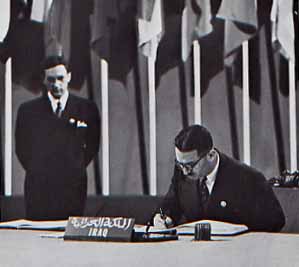
Who signed the United Nations Charter in 1945 for Iraq? Before giving the answer, here are a few details from an Iraqi diplomat’s life.
He was born in Baghdad in 1903 when the population of the city was only 140,000. His father, Sheikh Abbas was a shi’a religious leader; his mother the daughter of a famous female mullah from Hilla. The family lived near the Kadhimain mosque, the keeping of which had been entrusted in an Ottoman firman of 1611 to an ancestor of this diplomat. When he was accepted by the Christian American University of Beirut in 1921, it took a fatwa by a local mufti to allow him to go there. In 1929 he received a scholarship to take his Ph.D. in education from Columbia University. The title of his thesis was “The New Iraq: Its Problem of Bedouin Education.†While in America he met Ms. Sarah Powell, who became his wife in 1933.
Returning to Iraq, this future diplomat became Director General of Education. At that time most instructors of English in Iraq were Egyptian or Indian. The brash young American graduate recommended that the ministry hire Scots because they were more sociable, better-trained and spoke more clearly, unlike the English teachers who spoke incomprehensible English by constantly having pipes in their mouths. In 1943 our charter signer was transferred by Nuri Said to the Foreign Ministry, where he became Director General of Foreign Affairs. It was in this senior role that he was called upon to sign the United Nations Charter for Iraq. At the time only five Arab countries (Egypt, Iraq, Lebanon, Saudi Arabia and Syria) were represented among the 48 founding nations. During the 1940s and 1950s he served eight times as Foreign Minister and twice briefly as Prime Minister for Iraq.
In the 1958 coup this seasoned minister came very close to being killed. As he describes it:
“On the morning of 14 July, 1958, world news media said that I had been killed by the mobs in Baghdad. Actually, another unfortunate fellow was mistaken for me and killed.
On the morning of 17 July I was arrested in the wilderness north of Baghdad. In the following months I was interrogated, tried and sentenced by the special High Military Court of Iraq. I was condemned to death, sentenced to fifty-five years of imprisonment and fined over two hundred thousand dinars. The death sentence was imposed for my supposed plotting against Syria.
Actually, I never plotted against Syria, nor against any Arab state. I am a Muslim Arab nationalist who believes in the right of Arabs to be free and to unite by democratic processss.â€
One of the reasons the man survived was that he had friends in high places. President Nasser of Egypt advised the revolutionaries not to execute the former minister. King Hassan of Morocco refused to come to Baghdad until the man was released. Others who intervened on his behalf were U. N. Secretary General Dag Hammarskjold, Pope John XXIII, the President of Pakistan and the President of Tunisia. In 1961 he was released along with six other political prisoners. He died in 1997.
His name was Muhammad Fadhl Jamali.
Information taken from Harry J. Almond, Iraqi Statesman: A Portrait of Mohammed Fadhel Jamali (Salem, OR: Grosvenor Books, 1993) and Wikipedia (http://en.wikipedia.org/wiki/Muhammad_Fadhel_al-Jamali)